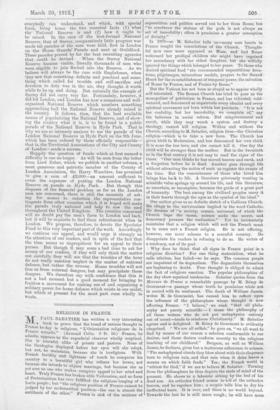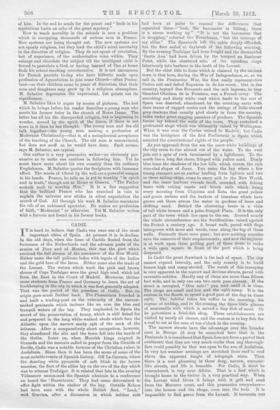"to overthrow the statues of the gods is not always
an In 1870—so M. Sabatier tells us—many sore hearts in France sought the consolations of the Church. Thought- 'they saw that something definite and practical and some- tions, pilgrimages, miraculous medals, prayers to the Sacred- thing which called for trouble and self-sacrifice and Heart for the re.establishment of temporal power, the salvation devotion to duty was in the air, they thought it worth of Rome by France, and of France by Rome." But the Vatican has not been so stupid as to appear wholly self-interested. The Roman Church has tried to pose as the Surrey did not carry very far. Fortunately, however, it did hit London, and London has now a numerous and well- monopolizer of patriotism in France, and has ridiculed, cold. organized National Reserve which numbers something watered, and denounced as unpatriotic every idealist and every approaching half the National Reserve already raised in spiritual movement not born within her precincts. "It is not the country. It follows, then, that the best available her credulity, but her incredulity, we complain of," say means of popularizing the National Reserve, and of show- the believers in social reform. But misgovernment and ing the country what it is, is to be found in a public revolt, while they may wreck a system and destroy a parade of the National Reserve in Hyde Park. That is theology, cannot kill religion. Within and without the why we are so intensely anxious to see the parade of the Church, according to M. Sabatier, religion lives—the Christian London National Reserve in Hyde Park on the 8th June, religion—which is to take a new form. The Church has which has been ordered by those officially responsible— given birth to Modernism, and has denounced her own child, that is, the Territorial Associations of the City and County It is none the less hers, and she cannot kill it. One day the of London—made a, success. child will be stronger than the mother. But in the twentieth Happily the question of funds which at first seemed a as in the first century it is not easy to read the signs of the difficulty is one no longer. As will be seen from the letter times. "One man thinks he has moved heaven and earth, and from Lord Esher, which we publish in another column, a is forgotten before he is dead. Another goes through life most generous and patriotic member of the County of without attracting the notice of such as register the events of London Association, Sir Harry Waechter, has promised the time. But the remembrance of those who loved him to give a sum of £2,000—an amount sufficient to brings him bark to life. A literature grievously wanting in cover the expenses of putting the London National scientific value springs up around his life, and this literature, Reserve on parade in Hyde Park. But though this disposes of the financial problem as far as the London so uncertain, so incomplete, becomes the guide of a great part u. ien are concerned, there is still the necessity of ask- of humanity. The best among the civilized peoples carry it mg for money to entertain the representative con- in their hearts through the ages as the symbol of the ideal." tangents from other counties, which it is hoped will make Our author gives us no definite sketch of a Galilean Church. the parade truly national and help to sow the seed He clings to the universalism implied in the word Catholic. throughout the United Kingdom. The counties concerned He dreams of "a society, cosmic, universal, of which the will no doubt pay the men's fares to London and back, Church lisps the name, science seeks the secret, and but it will be requisite to find them refreshment when in democracy pursues the realization." Yet he incidentally London. We propose, therefore, to devote the Spectator maintains that a religion which will suit the French must Fund to this very important part of the work. Accordingly be in some sort a French religion. He is not offering, we continue our appeal, and would urge it strongly on however, one more scheme to a scornful country. He the attention of our readers, and in spite of the fact that disappoints his readers in refusing to do so. He writes of the time seems so unpropitious for an appeal to their a tendency, not of its goal. purses. But though it may seem a bad time to ask for Why does he think that all signs in France point in a money of our readers, if they will only think the matter religious direction ? For one thing materialism, what he out carefully they will see that the troubles of the hour calls atheism, has failed—so he says. The common people do not really sanction neglect in the matter of national are impatient of its dogmatism. The dogmatists themselves defence, but rather the reverse. Home troubles will not are beginning to doubt. Free thought is obliged to admit free us from external dangers, but may precipitate those the fact of religious emotion. The popular philosophies of dangers. We therefore say with confidence that this is the day show mystical tendencies. Sabatier quotes from the not. a bad moment but a good moment for bringing to Mercure de France a remarkable passage by M. Remy do fruition a movement for making use of and organizing a military power for home defence which exists in our midst, Gourmont—a, passage whose truth he proclaims while not in accord with its sentiment. The death of William James, but which at present for the most part runs wholly to waste. writes M. de Gourmont, has caused him to reflect upon the influence of the philosophers whose thought is now affecting France. "I believe," we read, "that all philo- sophy not purely scientific — I mean the philosophy of all those writers who do not put metaphysics entirely MPAUL SAB.A_TIER has written a very interesting out of count—tends to reinforce Christianity." M. Sabatier i . book to prove that the trend of serious thought n agrees and is delighted. M. Remy de Gourmont is evidently France to-day is religions, " L'Orientation religieuse de la chagrined. "We are all selfish," he goes on, "we all want to France actuelle." (Armand Colin. 3 fr. 50.) France, he find by means of our reason a solution conformable to our admits, appears to the superficial observer wholly sceptical. desires, and those desires conform secretly to the religious She is scornful alike of priests and pastors. None of teaching of our childhood." Bergson, as well as William the theologies displayed before her eyes will she adopt, James, he declares, gives but a traitorous adherence to science. but not,, he maintains, because she is irreligious. With "The metaphysical clouds they blow about with their eloquence French lucidity and lightness of touch he compares his turn to religious rain, and that rain when it dries leaves a country to a beautiful girl who refuses her lovers, not manna on which faith feeds." Yes ; the French world is because she intends to abjure marriage, but because she as yet sees no one who makes complete appeal to her mind and "athirst for God," if we are to believe M. Sabatier. Turning from the philosophers he thus depicts the state of mind of the heart. Truly France has broken with Vaticanism„ and no form
peasant. He shows us a labourer sitting by the bed of his of Protestantism has ever fulfilled the religious longing of a dead son. An orthodox friend comes to tell of the orthodox Latin people ; but "the religious position of France cannot be heaven, and he repulses him ; a sceptic tells him to dry his judged by her ecclesiastical position—the ono is almost the
ineffectual tears. it is over, and there is no world beyond. antithesis of the other," France is sick of the mixture of Towards the last he is still more rough ; he will have none of him. In the end he sends for the priest and "finds in his mysterious Latin an echo of the great mystery."
How to teach morality in the schools is now a problem which is occupying thousands of serious men in France. New systems are being thought out. The new systems are not openly religious, but they lead the child's mind inevitably in the direction of religion. They do not speak of revelation, but of experience, of the authoritative voice within. They enlarge and elucidate the subject till the intelligent child is forced to postulate a God, or having learned of One at home finds his school-teaching corroborative. It is not uncommon for French parents to-day who have hitherto made open profession of Agnosticism to join some Church—often Protes- tant—as their children come to years of discretion, that their sons and daughters may grow up in a religious atmosphere. M. Sabatier deprecates the experiment, but points out its significance.
M. Sabatier likes to argue by means of pictures. The last which he brings before his reader describes a young man who meets his former tutor in the church of Notre Dame. The latter has all his life disregarded religion, but is beginning to wonder, moved by the spirit of the times, if there is not more in it than he ha thought. The young man and the old talk together—the young man making a profession of Modernist Christianity—that is, of a metaphorical acceptance of the teaching of the Church. The old man is unconvinced, but does not scoff as he would have done. Snch scenes, says M. Sabatier, are typical.
Our author is a very persuasive writer—so obviously per- suasive as to make one cautious in following him. Yet be must know more about his own country than the ordinary Englishman. M. Sabatier quotes the Scriptures with immense effect. The words of Christ by the well are a powerful weapon in his hands. France, he tells us, is yet to worship "in spirit and in truth," though not at Rome or Geneva. "The Father Becketh such to worship Him." It is a fine suggestion that the brilliant France who has searched in vain to explain the universe now abides in silent expectation the search of God. All through his work M. Sabatier maintains the rile of an unbiassed spectator. He makes no profession of faith, " Modernist " or otherwise. Yet M. Sabatier writes with a fervour not found in his former books.







































 Previous page
Previous page